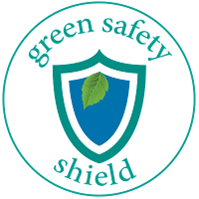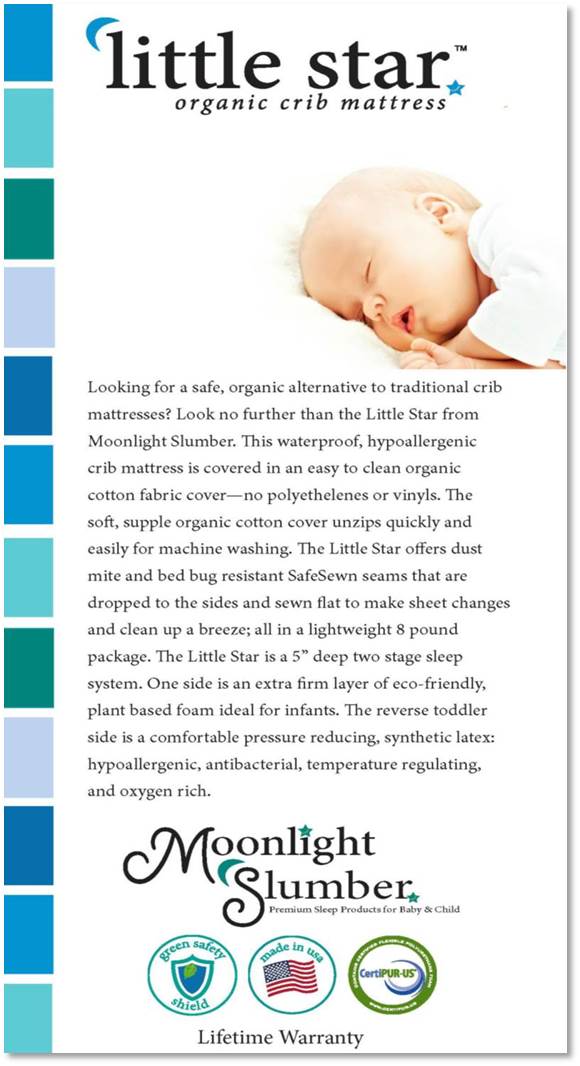Dads and Moms want what’s best for their babies, so some companies feature adjectives like “organic” or “natural” in ads for infant gear. Those are among the terms Illinois-based Moonlight Slumber used to sell its baby mattresses online and at some of the nation’s biggest retailers. But according to an FTC complaint, when it came to backing its mattress claims with proper support, the company was asleep at the switch.
In ads for its Starlight Simplicity and Little Star mattresses, Moonlight Slumber described the products as “organic” and “a safe, organic alternative to traditional crib mattresses” with a “Natural Latex Core.” The company said other mattresses it sold were made from “BabySafe Natural Materials,” including “eco-friendly plant-based foam.” The company also claimed that testing proved “there are no VOCs (Volatile Organic Compounds, commonly known as ‘Off Gassing’).”
 And Moonlight Slumber suggested that parents didn’t have to just take their word for it. According to a logo the company prominently displayed, its products had the “Green Safety Shield.”
And Moonlight Slumber suggested that parents didn’t have to just take their word for it. According to a logo the company prominently displayed, its products had the “Green Safety Shield.”
Organic and natural? Won’t emit VOCs? Proven by testing? Bearing the Green Safety Shield? On a parent’s shopping list, that’s a check, check, check, and check. But according to the FTC, those claims were deceptive, deceptive, deceptive, and deceptive.
The complaint alleges that a substantial majority of the content in the Starlight Simplicity and Little Star mattresses wasn’t organic. The cores and fire barriers contained no organic content at all and the cotton cover was 70% non-organic. In fact, according to the FTC, the only purely organic content was the mattress ribbon, a minor decorative component.
What’s more, most of the company’s mattress cores were made wholly or primarily of polyurethane, a non-natural material made from isocyanates and polyols derived from petrochemicals. Despite Moonlight Slumber’s ad claims, the latex core for the Little Star mattress was synthetic, not natural – and six other mattress styles contained little or no plant-based material. The FTC also alleges that the company didn’t have sound science to support the claim that its products didn’t emit substances like VOCs. What about Moonlight Slumber’s representation that it had testing to back up that promise? False, says the FTC.
 And who bestowed the “Green Safety Shield” on Moonlight Slumber? The company awarded the seal to itself.
And who bestowed the “Green Safety Shield” on Moonlight Slumber? The company awarded the seal to itself.
The proposed order prohibits a host of misrepresentations about whether a product is organic, natural, plant-based, emissions-free, or VOC-free. It also requires appropriate proof for testing claims and for representations about other environmental and health benefits. In addition, the order nixes misleading certifications and requires the company to clearly disclose when it has a material connection to an endorser. The FTC is accepting public comments about the proposed settlement until October 30, 2017.
For companies that want to rest easy about their substantiation obligations, the case offers two take-aways.
Consumers won’t take deceptive organic claims lying down. Advertisers must substantiate their organic claims. The U.S. Department of Agriculture’s National Organic Program develops standards for organically-produced agricultural products. For other product categories not covered by the National Organic Program, long-standing FTC substantiation principles apply. Advertisers must have a reasonable basis for claiming that their non-agricultural products – for example, mattresses – are “organic.” FTC and USDA staff, along with various stakeholders, discussed these issues at an October 2016 roundtable on consumer perception of organic claims.
It’s risky to sign, seal, and deliver your own seals. Duck-lipped mirror shots used to be our least favorite form of selfie, but we have a new cellar dweller: seals or certifications that companies award themselves without clearly explaining that to consumers. As the FTC’s Green Guides and dozens of law enforcement actions establish, misleading certifications raise particular concerns when they appear to give an independent authoritative A-OK for health, safety, or environmental claims that consumers can’t evaluate for themselves. If your ad features seals or certifications of your own designation, make that abundantly clear to consumers.
